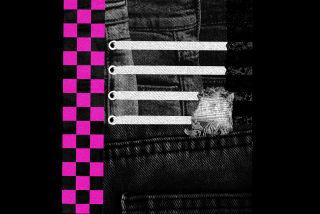Hazing investigation is sour note for Georgia marching bands
- Share via
Reporting from Decatur, Ga. — Sixteen-year-old Wayne Ross has a hard time believing that the musicians in his high school marching band — the ones who put in grueling hours of practice, the ones admired for their high-stepping panache, the ones celebrated in their own reality TV show — could be associated with the lurid hazing scandal unfolding 260 miles away at Florida A&M University.
“Everyone around here loves the band,” Ross said last week while walking to class at Southwest DeKalb High School. “They’re a big influence on everyone.”
While no one has pointed a finger directly at this school, officials are exploring whether the hazing culture that has rocked Florida A&M has roots in metro Atlanta.
It’s a troubling prospect in a region where African American marching bands launch college careers, nourish the pop music industry and deliver joyous spectacles that often outshine the sporting events they are meant to promote.
Last week in DeKalb County, education officials suspended marching band activities at its 21 high schools, including Southwest DeKalb High, after discovering two incidents at two schools that may violate policies against bullying and hazing. Officials did not publicly name the schools.
The action was sparked by the death of FAMU drum major Robert Champion, who died Nov. 19 after a suspected hazing incident, and by the alleged beating a few weeks earlier of Bria Hunter, a FAMU clarinetist. On Friday, Florida officials ruled Champion’s death a homicide.
Hunter and Champion graduated from Southwest DeKalb High, a tidy, modern campus a few miles east of Atlanta. According to the Atlanta Journal-Constitution, three FAMU students arrested in Hunter’s case also attended DeKalb County schools.
Police allege the suspects were inducting Hunter into a subgroup for band members from Georgia called the “Red Dawg Order.”
Walter Woods, a spokesman for the 98,000-student DeKalb County School System, said its internal affairs office was interviewing high school students, band instructors and parents to determine whether hazing had become a ritual associated with band membership.
“We hope we find nothing,” Woods said, “but we have to err on the side of caution.”
The incident at FAMU, one of the nation’s historically black colleges and universities, or HBCUs, has sparked soul-searching and nervousness on campuses nationwide.
“Robert’s death has opened everyone’s eyes to what ALL bands, especially HBCU bands, are doing, big or small,” a commentator who claimed an association with the FAMU band warned at the5thquarter.com, a popular marching band site. “This could easily be your school, your organization.”
In Atlanta, it means a new kind of scrutiny in a city that has endeavored to bring the black marching band aesthetic to the widest possible audience. The well-received 2002 film “Drumline,” a drama about an aspiring drummer at a fictional black college, was shot here, with the Southwest DeKalb Marching Panthers serving as the fictional college band.
The modern bands tend to move easily between stirring marches and raucous takes on the latest hip-hop hits, extending a rich tradition of musical mingling. William Dukes Lewis, executive director of the Piedmont Council of Traditional Music in Raleigh, N.C., has noted that the great W.C. Handy, often called the “Father of the Blues,” was hired away from his job as a cornet player in a minstrel show in 1900 to become music director at Alabama’s Agricultural and Mechanical College, where he instructed the band to slip in ragtime pieces among more traditional fare.
Since then, black marching bands have produced innumerable jazz innovators and classical music virtuosos. Perhaps as important, they have also propelled innumerable black students to college with music scholarships.
Such opportunities are cherished in DeKalb County, a suburb that is home to a burgeoning black professional class and others who hope to reach that level soon — including the 15% of families living below the poverty level.
Woods says that the investigation is necessary to preserve those opportunities and to flush any taint of scandal from the school system, which is more than 80% African American. “There’s a lot at stake,” he said.
But the ban on marching band activities has angered parents like Keith Sailor Sr., president of Southwest DeKalb High’s band booster board.
“They’re investigating our kids now and automatically linking them to the situation” at FAMU, said Sailor, a FAMU graduate and former percussion instructor at the high school. “... That’s treating these kids as if they’re suspects in a crime that’s taking place in another state.”
At South DeKalb High, which a poster declared a “No Bullying Zone,” many students said they hadn’t heard of a tradition of hazing among the 200-plus members of the Marching Panthers.
Xavius Thompkins, 17, a junior, doubted that violence was part of their ritual. “But if it is, it’s a problem,” he said. “Because the band is supposed to make an example of how to be a leader. And you can’t be a leader if you’re doing things like that.”
More to Read
Sign up for Essential California
The most important California stories and recommendations in your inbox every morning.
You may occasionally receive promotional content from the Los Angeles Times.













